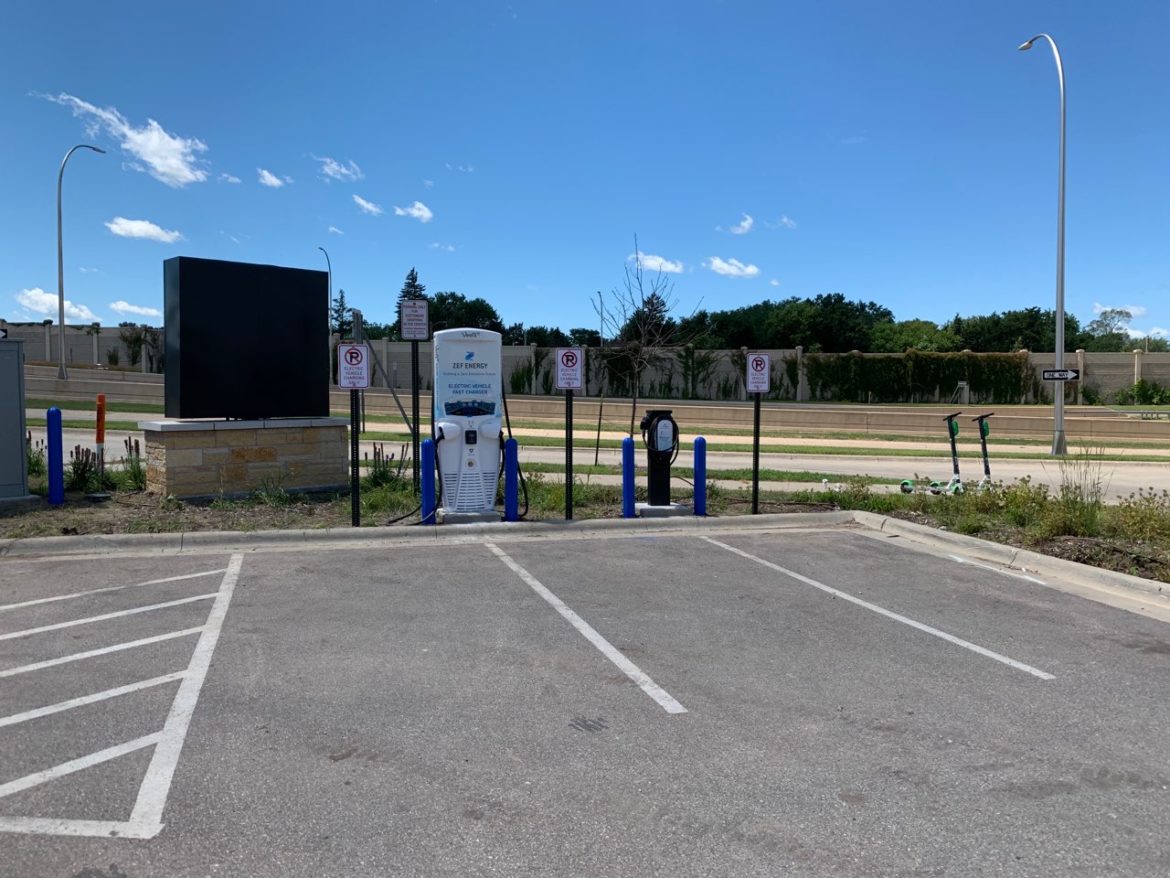
ZEF Energy / Courtesy
A new charging station in Rochester, Minnesota.
A private company is installing a new network of fast-charging stations along highways outside the metro as part of the state’s Volkswagen settlement spending.
The largest electric vehicle infrastructure project in Minnesota’s history is getting underway as installations begin for a network of 22 fast-charging stations along major state highways.
The fast chargers can fully charge an electric vehicle in 30 to 40 minutes, substantially faster than the more common Level 2 chargers. They’re being installed by ZEF Energy as part of a state effort to build out a fast-charging network outside of the Twin Cities metro area, where a robust network already exists.
The $1.7 million initiative used money from the state’s share of the Volkswagen emissions cheating settlement, which is being managed by the Minnesota Pollution Control Agency.
With the first batch of fast chargers expected to be completed by October, the agency announced in late August a second initiative to spend $2.6 million from the settlement on 38 additional fast chargers in greater Minnesota. The agency has not chosen a partner for that phase.
ZEF Energy operates 80% of the fast-charging network in the Upper Midwest and builds its own Level 2 chargers, mainly using suppliers in the region. The company currently works in 15 states and recently completed a significant charging project at Indianapolis International Airport.
Since the grant money does not pay for the entire cost of fast chargers, Blackler had sought business sponsors to help pay for chargers. After the pandemic hit, he found no takers. Instead, local utilities and city officials helped find charging sites that would be accessible to drivers and acceptable to communities, including locations in St. Cloud, Bemidji, Detroit Lakes, Grand Rapids, Rochester, Albert Lea, Mankato and Marshall.
“The way they really helped us is by identifying locations,” he said. “That is actually one of the most time-consuming things that we have to do.”
ZEF Energy is installing fast chargers in parking lots near retail areas where visitors can enjoy a meal, a cup of coffee or a walk while their vehicles charge up. The state required locating fast-charging sites within a mile of major highways and close to retail areas.
Blackler found business car park owners generally did not want to host chargers due to the loss of spaces, leaving the best option being government-owned lots near retail establishments.
The state agency overseeing the project believes the fast-charging network will help foster a transition to cleaner transportation. Fossil fuel cars account for 70% of all transportation sector emissions in the state. The state wants electricity to power 20% of light-duty vehicles by 2030, a key element in its goal of reducing greenhouse gases by 80% by 2050, said Rebecca Place, the Pollution Control Agency’s electric vehicle coordinator.
Drivers are looking forward to the new chargers. “We get calls that ask us ‘when are they going to be in?’ And for people considering buying an EV [the charging network] takes away from range anxiety,” Place said.
ZEF Energy and the Pollution Control Agency say the charging stations now being installed will serve a dual purpose: allowing electric vehicle owners to travel longer distances and encouraging other drivers to consider switching their fuel source. Although the number of electric vehicles doubled from 2018 to 2019 in Minnesota, they still represent just a small slice of vehicle sales.
Many consumers see electric vehicles now as second cars for use on local trips, but additional chargers will likely change that way of thinking, Place said. Drivers should now have the confidence that with the charging networks, they can drive electric wherever they travel, she said.
“Electric cars are here — and here to stay — and installing more charging stations just makes sense,” said Joshua Houdek, senior program manager at the Sierra Club North Star Chapter. “With plenty of places to charge, the further we can go. Range anxiety is a hurdle to switching to electric, but more chargers across the state address this consumer confidence issue head-on.”
The second budget cycle will expand the fast-charging network by 2,500 miles by focusing on seven corridors: State Highway 61 from Duluth to Grand Portage State Park; State Highway 1 between Ely and Thief River Falls; U.S. Route 59 from Granite Falls to Karlstad, and State Highway 23 connecting Marshall, Pipestone and other locations.
The routes differ from the first VW settlement-funded charging network but the state continues to require station locations to be no more than 70 miles apart. Each charging station with both phases will have a fast charger and two slower charger ports that take much longer. The state required charging stations to have 350 kilowatts of electricity available to prepare for further expansion.
Minnesota continues to spend its $47 million share of the VW agreement on electrifying the transportation system. The agency has received many inquiries from organizations that would like to have an onsite charger paid for through the settlement. A new grant program coming this fall will help businesses, nonprofits and government agencies pay for Level 2 chargers, Place said.
A third round of VW funding coming later will bring more money for chargers. Under the settlement, states can use as much as 15% of their budget for charging infrastructure, Place said. The Minnesota Pollution Control Agency also unveiled in August a $3 million electric school bus grant program that would bring new vehicles to the road in 2022.
"electric" - Google News
September 11, 2020 at 04:59PM
https://ift.tt/2FmHQH7
Minnesota electric car drivers will see 22 new places to fast charge this fall - Energy News Network
"electric" - Google News
https://ift.tt/2yk35WT
https://ift.tt/2YsSbsy
Bagikan Berita Ini














0 Response to "Minnesota electric car drivers will see 22 new places to fast charge this fall - Energy News Network"
Post a Comment